Great Wall Motor plans to launch 2 EVs in Germany in late 2022
Chinese vehicle company Great Wall Motor (GWM) plans to launch its Ora and Wey brands on the German market from the end of 2022. To this end, the company entered into a partnership with car dealer Emil Frey Group. As Xiangjun Meng, European market manager of GWM told mobility blog Ecomento, other countries besides Germany will be targeted by the new alliance in the future. GWM announced the expansion of its business to Europe as early as 2021 at IAA Mobility, with the first vehicles to be delivered in the fourth quarter of 2022. The e-car brand Ora will kick things off with the all-electric Funky Cat (known as the Good Cat in other markets) and the premium brand Wey with the plug-in hybrid Coffee 01.
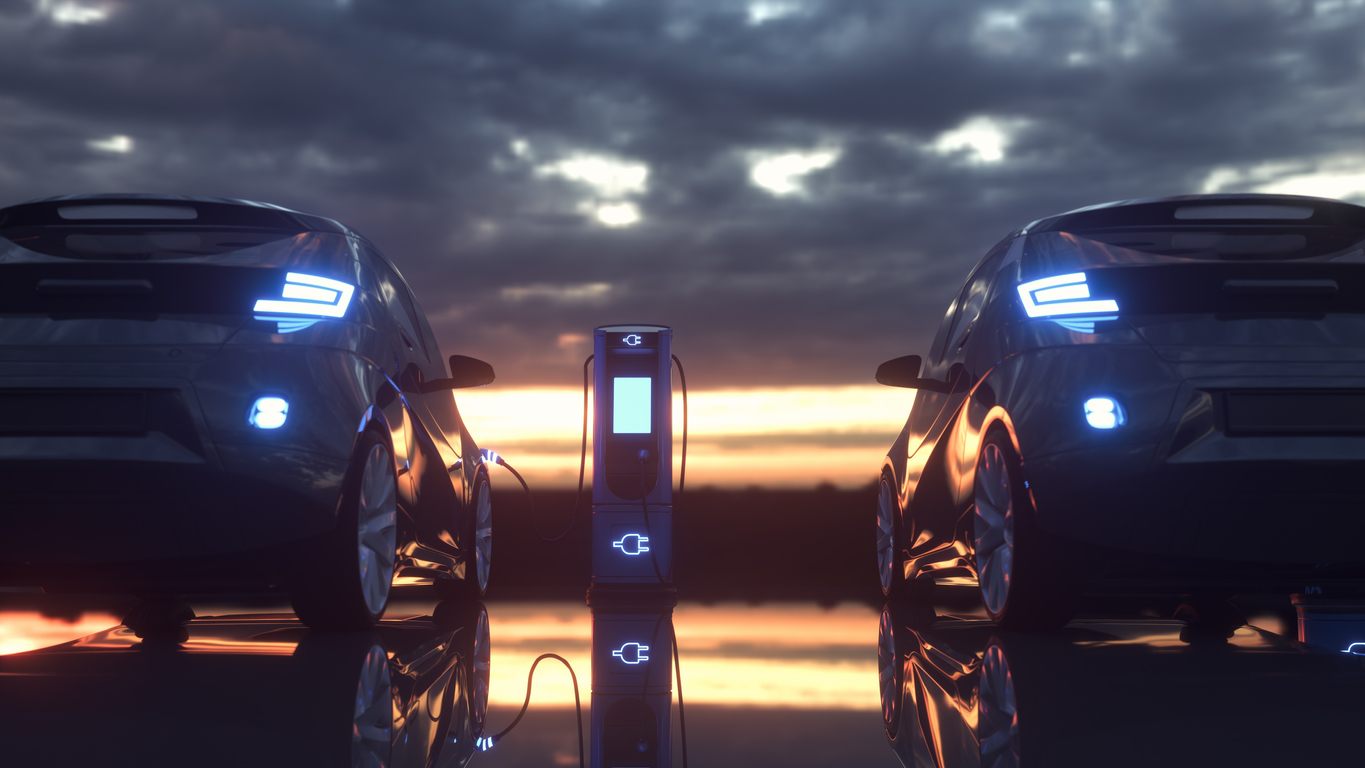
The SUV, which is just under five meters long, is in the premium segment and has a combined gasoline and electric motor output of 350 kW / 476 hp. Acceleration from zero to 100 takes five seconds, the top speed is 235 km/h. GWM states a purely electric range of up to 150 kilometers. The compact Ora Funky Cat comes as a hatchback variant in retro design at 4.24 m in length. The soft lines and round headlights are somewhat reminiscent of the classic VW Beetle, but inside the Funky Cat is state-of-the-art technology. As an all-electric vehicle, it is offered in two battery sizes and engine options: 49 kWh for 300 km and 63 kWh for 400 km range according to the WLTP standard. The smaller engine produces 105 kW / 143 hp, the larger 126 kW / 171 hp. At 160 km/h, the speed of the Funky Cat is electronically limited. Gerhard Schürmann, CEO of the Emil Frey Group, expects a successful sales launch and many prospective buyers.
The certification of vehicles is a highly complex project that requires professional support in all phases. MPR China Certification GmbH has been active in this field for several years.
We will be happy to advise you without obligation about the scope and requirements for vehicle registration. In China, CCC certification is required for vehicles.
Please do not hesitate to contact us for further details and consultation. You can contact us via e-mail, or call us (UK: +44 2071931135, Europe: +49 69 2713769150, US: +1 773 654-2673).
Please don’t hesitate to also use our chat-window in the bottom right corner if you have any questions. (Please check your browser settings if you can’t see the window)
Review and Withdrawal of CCC Self-Declaration certificates by CNCA
On June 15, 2022 the Certification and Accreditation Administration of the People’s Republic of China (CNCA) published the results of a governmental review of valid Chinese CCC Self-Declarations (CCC SD) for the first time since their creation. Key points of the analysis were the submitted evidence of the conformity of production (CoP) of registered manufacturers and the self-declarations they uploaded to the system. In 460 cases, the authority registered serious non-conformities, which were published in announcement no. 17/2022.
Ensuring CoP with national standards is generally a key concern of Chinese certifications. In the case of “ordinary” CCC certification, voluntary CQC certification or voluntary CCAP certification, it is examined as part of regular audits. In cases of the CCC Self-Declaration without additional voluntary certification, it is the responsibility of the manufacturers and their Chinese applicants to ensure CoP themselves. Certain products such as electrical fuses and switches, seats and headrests, vehicle mirrors and safety glass, require a CCC Self-Declaration and is associated with increased self-reliance for the manufacturers and Chinese applicants.
While assessing the valid Self-Declarations, CNCA identified 19 CCC cases that failed the authority’s requirements and were immediately withdrawn. For 14 of them, the deficient CoP documentation was identified by CNCA itself, while the other 5 CCC Self-Declarations, the negative pre-assessment was issued by local inspectors during an external audit. The sale or import of the affected products to China was immediately banned and a reapplication was blocked for 6 months as a penalty. The manufacturers and “applicants” also risk considerable consequences for their rating in the National Enterprise Credit Information System.
In addition to these 19 cases, the CNCA classified a much larger number of 441 Self-Declarations as similarly incomplete, while at the same time recognizing potential for improvement. The relevant manufacturers and applicants were granted a deadline of 2 months to correct the CoP or its documentation in the system so that it conforms with the required standards. If the Self-Declarations concerned still do not comply with Chinese regulations after this time, the corresponding approvals will be revoked as well.
Affected manufacturers include Chinese and as well as a number of foreign companies, including well-known and globally active enterprises. Information on the deficient CCC Self-Declaration numbers, the names of the Chinese applicants, product category, and the reason for the rejection are publicly accessible. However, the authority did not contact the manufacturers directly, as certified companies need to check on relevant announcements themselves according to Chinese regulations.
Since the introduction of the CCC Self-Declaration, MPR China Certification GmbH has been supporting manufacturers of affected product categories worldwide in the entire preparation, application, and follow-up process. Having excellent relationships with the certification bodies, we ensure that the submitted application documents and CoP evidence comply with the regulatory guidelines and inform you about any changes as soon as possible. We also track all relevant announcements from CNCA and other important certification institutions. This will allow you to focus on your core business and protects you from potential certification-related consequences on the Chinese market.
For more information on how CCC certification, the CCC Self-Declaration and voluntary CCAP or CQC certification may affect your company, or for more information about CCC certification in general, the process, and the associated costs, please visit our News Section where you will find current updates twice a week.
Please do not hesitate to contact us for further details and consultation. You can contact us via e-mail, or call us (UK: +44 2071931135, Europe: +49 69 2713769150, US: +1 773 654-2673).
Please don’t hesitate to also use our chat-window in the bottom right corner if you have any questions. (Please check your browser settings if you can’t see the window)
You can also check out our free CCC-Brochure, which can be downloaded right here as a PDF file or you consult our book (in English) “A Brief Guide to CCC: China Compulsory Certification”, which can be found directly here on Amazon.
Here you can download our brochure about the CCC Self-Declaration.
Here you can download our brochure about the voluntary CCAP or CQC certification.
MPR at the 6th German-Chinese Automotive Congress in Berlin
On September 20, 2022, MPR China Certification GmbH participated in the 6th German-Chinese Automotive Congress in Berlin. The top-class event was organized by CIPA (China International Investment Promotion Agency) and aBB automotive BerlinBrandenburg e.V..
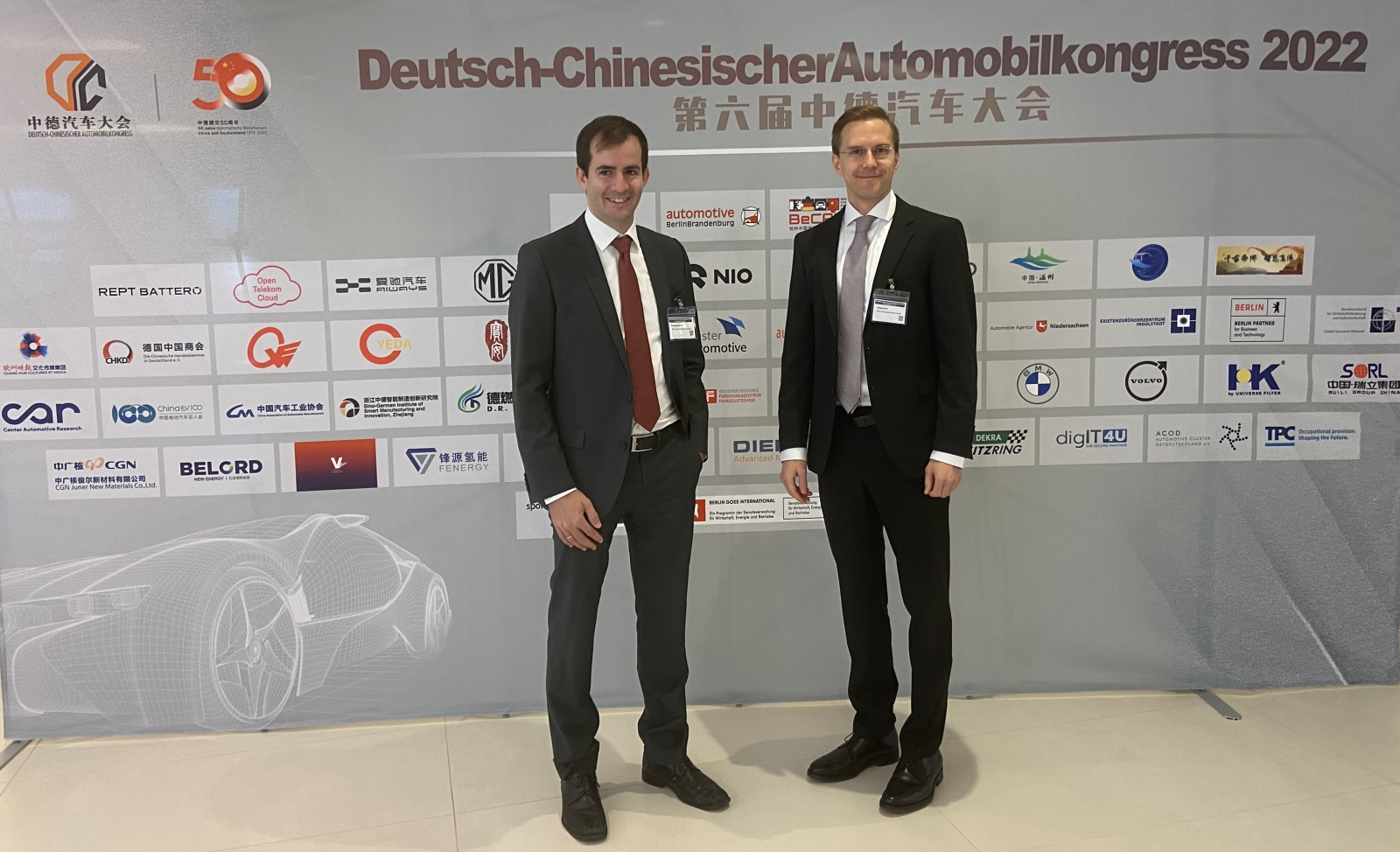
Under the motto of the congress “Climate neutrality and future mobility”, important industry representatives from Germany and China met for a diverse exchange of ideas. In addition to the hundreds of participants on site, several thousand participants from China were also connected virtually.
Julian Busch, Managing Director of MPR China Certification GmbH and Christoph Graffius, Business Development Manager of MPR China Certification GmbH, were in attendance and actively participated in the conversation and exchange of ideas.
Greetings were given by the Chinese Ambassador in Berlin Mr. Ken Wu and the Director General of CIPA Dianxun Liu. There were many interesting speakers including Dr. Hans-Peter Friedrich (Member of the Bundestag and former Federal Minister), Rudolf Scharping (former Federal Minister) and Prof. Ferdinand Dudenhöfer (CAR Center Automotive Research) to mention a few.
Numerous Chinese vehicle manufacturers presented themselves at the congress and outlined their strategy for opening up the European market.
Nio presented the soon to be available high-quality vehicles as well as their own interchangeable battery stations.
Xiaopeng/ Xpeng presented the latest vehicle models and equipment variants of the vehicles on site.
Geely has already been present on the European market for many years and presented the structures it has built up to date and the impressive growth of its development site in Frankfurt.
Aiways also introduced its vehicles and its strategy of simplifying processes in production and market entry.
Great Wall Motor was also present with its own vehicles and gave insight into the model range that is to be launched in Europe in the coming years.
Also present was MG Motor/ SAIC Motor, which introduced its range of vehicles.
Numerous manufacturers of battery systems also informed the audience about the latest trends in their industry.
Here, the system from the German-Chinese joint venture INFRAMobility-Dianba GmbH, which offers a manufacturer-independent battery exchange system, is particularly interesting.
MPR China Certification GmbH participated with great pleasure in this successful congress and is looking forward to the 7th German-Chinese Automotive Congress to be held in China.
For more information on how CCC certification, the CCC Self-Declaration and voluntary CCAP or CQC certification may affect your company, or for more information about CCC certification in general, the process, and the associated costs, please visit our website and our News Section where you will find current updates twice a week.
Please do not hesitate to contact us for further details and consultation. You can contact us via e-mail, or call us (UK: +44 2071931135, Europe: +49 69 2713769150, US: +1 773 654-2673).
Please don’t hesitate to also use our chat-window in the bottom right corner if you have any questions. (Please check your browser settings if you can’t see the window)
You can also check out our free CCC-Brochure, which can be downloaded right here as a PDF file or you consult our book (in English) “A Brief Guide to CCC: China Compulsory Certification”, which can be found directly here on Amazon.
Here you can download our brochure about the CCC Self-Declaration.
Here you can download our brochure about the voluntary CCAP or CQC certification.
Adjustment of the CCC catalog regarding Li-Ion batteries, power supplies and other products
On September 17, 2022 the General Office of the State Council of the PRC issued a new announcement on the adjustment of the CCC catalog. Lithium-ion batteries and power supplies/chargers with high safety risks will be included in the mandatory certification management (CCC certification), while mandatory CCC will no longer be required for 9 product categories such as data terminals, multimedia terminals, audio power amplifiers and other products with low safety risks and more mature technology (see Appendix 1).

The State Council hereby submits an opinion on adjusting and optimizing the compulsory certification procedures and conducting factory inspections before certification according to the “double random, one disclose ” method (Random selection of inspection objects, random selection of law enforcement inspectors, promptly disclosed to the public).
Other important topics of the announcement are the scientific and reasonable determination of the frequency of post-certification supervision and inspection in combination with factors such as enterprise credit status and product quality, national supervision and random inspection, and strengthening product consistency supervision and inspection. Vehicles and components must be awarded a CCC certificate in order for the products to be exported to China or manufactured locally.
Annex 1:
Products removed from the CCC catalog (9 types):
- active loudspeaker systems with one or more loudspeakers with a maximum output power below 500 W (R.M.S.) (0801).
- audio power amplifiers (0802)
- various carrier forms of audio and video recording, reproducing, and processing equipment (including various types of optical discs, tapes, hard disks, and other carrier forms) (0805, 0812)
- electronic piano (0813)
- cordless telephone terminal equipment (1604)
- data terminal (1608)
- multimedia terminal (1609)
- intruder detector (1901)
- controls for anti-theft alarm systems (1902)
Products to be included in the mandatory certification management (2 categories)
- lithium-ion batteries, battery packs and mobile power supplies used in electronic and electrical products
- power adapters/chargers for telecommunications terminal equipment.
If you have any questions regarding the planned CCC certification of any of these products, please do not hesitate to contact us. Currently there are no implementing regulations for the certification of the new products. However, we will be pleased to keep you informed.
The products that were previously subject to certification may qualify for voluntary certification in the future by the CQC. Please contact us if you are interested.
BYD, market leader for EVs in China, will launch three models on the German market
For some time now, the Chinese manufacturer of EVs BYD has displaced the previous global market leader Tesla from the top position. Now the company, whose abbreviation BYD stands for “Build your Dreams”, will also start selling three models in Germany towards the end of the year. The Atto 3 will be the entry-level model and will compete against EVs like the VW ID.3. The compact SUV with a length of 4.45 m has a motor on the front axle with 150 kW / 204 hp output, which allows a top speed of 160 km/h. According to BYD, a range of 420 kilometers can be covered with the 60.5 kWh battery.
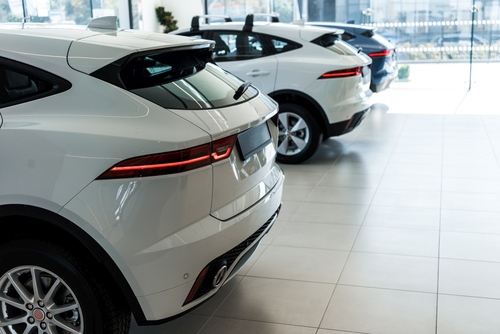
The second model is the larger Tang, also designed in the style of an SUV. Two motors, one per axle, provide all-wheel drive and together produce 380 kW / 517 hp. In line with the more powerful engine, the top speed of the Tang is 180 km/h, and there is room for up to seven people inside. According to BYD, an 86.4 kWh battery installed in the underbody as a structural element should enable a range of up to 400 kilometers on a single charge.
Last but not least, after the two SUVs, the Han electric sedan joins BYD’s preliminary German portfolio. The five-meter-long vehicle is in the same class as the Tesla Model S or the Mercedes EQE. The Han has the same motorization and battery capacity as the Tang, but is said to be able to travel up to 521 kilometers due to better aerodynamics.
Since the technology of BYD’s EVs for Germany are identical to the global specifications, the manufacturer can already provide detailed information for this. BYD’s European headquarters are located in The Hague, Netherlands. BYD has not yet named a partner or distribution channel for sales in Germany. Likewise, the prices for the EVs are not to be disclosed until the market launch in the fall of this year.
For more information on how CCC certification, the CCC Self-Declaration and voluntary CCAP or CQC certification may affect your company, or for more information about CCC certification in general, the process, and the associated costs, please visit our website and our News Section where you will find current updates twice a week.
Please do not hesitate to contact us for further details and consultation. You can contact us via e-mail, or call us (UK: +44 2071931135, Europe: +49 69 2713769150, US: +1 773 654-2673).
Please don’t hesitate to also use our chat-window in the bottom right corner if you have any questions. (Please check your browser settings if you can’t see the window)
You can also check out our free CCC-Brochure, which can be downloaded right here as a PDF file or you consult our book (in English) “A Brief Guide to CCC: China Compulsory Certification”, which can be found directly here on Amazon.
Here you can download our brochure about the CCC Self-Declaration.
Here you can download our brochure about the voluntary CCAP or CQC certification.
Team Event 2022 for MPR China Certification GmbH in Frankfurt
This year’s team event of MPR China Certification GmbH took place on September 14, 2022. After a long time of planning, a date was found where all members of the team from Germany could come together.
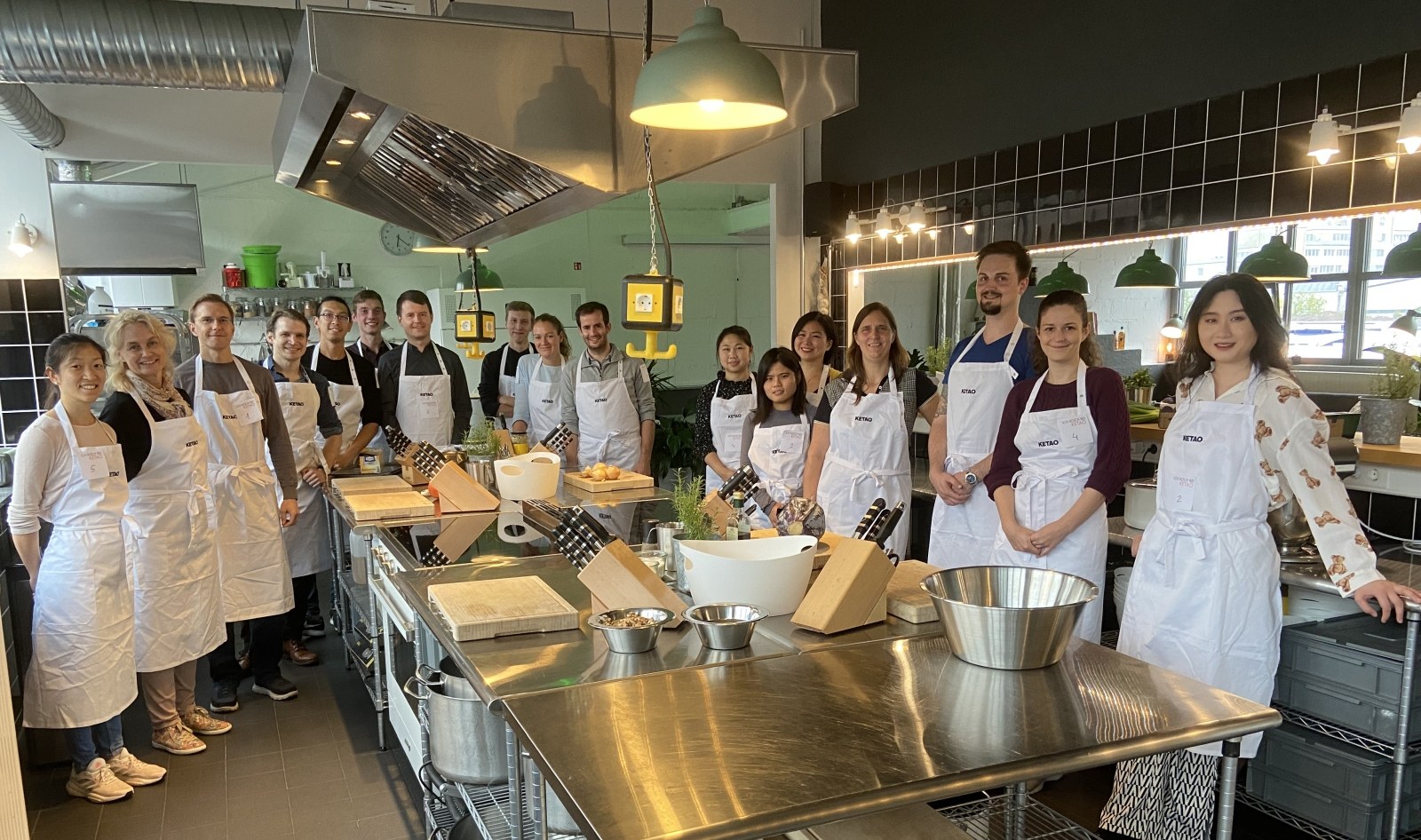
After the preliminary sports program in the form of stand-up paddling (SUP) on the river Main had to be postponed for the time being due to rain, the group gathered in the evening for a joint cooking class, which was professionally guided.
Under the helpful and instructive supervision of the professional chef from Ketao present, a wonderful 6-course meal was prepared in collaboration. The dishes were refined according to the recommendations of the chef, with magnificent results.
The event offered a lot of opportunity for exchange and there with an excellent atmosphere. The sociability and the gathering of all employees from Germany was a special and valuable experience for us all. We are glad that everyone enjoyed it and are grateful for the strong team spirit that prevails in our company.
MPR China Certification GmbH would also like to thank its customers for their continued trust. We continue to be at your disposal for professional consulting and implementation of certification projects world-wide.
New Standard GB 16897-2022 for Brake Hoses
On August 31, 2022 China’s State Administration for Market Regulation (SAMR) announced that three new mandatory National Standards that will be published. One of the new GB standards is GB 16897-2022 for “Structure, Performance Requirements and Test Methods of Brake Hoses.
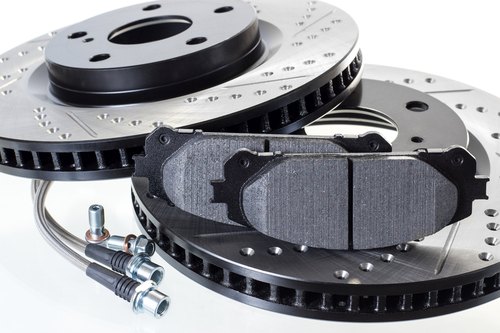
Previously, this had been covered by the standard GB 16897-2010.
The new standard covers, among other things, brake hoses for different types of vehicles (general testing, air brake, vacuum brake hoses, hydraulic brake hoses). It contains definitions, components, construction details, as well as descriptions of the necessary tests, procedures and requirements for the different brake hose types. In addition to annual tests, brake hoses must also pass annual random sample tests for certification in China.
Exact information on changes will be known later when the new standard is published. The exact publication date is not yet known.
Brake hoses fall within the scope of voluntary CCAP certification or CQC certification.
Since Announcements No. 11, 2018 and No. 44, 2019 by the China CNCA, the previously existing CCC requirement of certain automotive products such as interior trim components, door latches, door hinges, fuel tanks, brake hoses and automotive horns has been removed with immediate effect. However, since the corresponding national Chinese guidelines, known as GB Standards, are still valid and must be complied with, the voluntary certifications with the CCAP or the CQC provide manufacturers with security for the introduction of their products into the Chinese market. Many vehicle manufacturers also insist on submitting such certification in order to demonstrate on-going product conformity in the extremely important Chinese market.
For more information on how CCC certification, the CCC Self-Declaration and voluntary CCAP or CQC certification may affect your company, or for more information about CCC certification in general, the process, and the associated costs, please visit our website and our News Section where you will find current updates twice a week.
Please do not hesitate to contact us for further details and consultation. You can contact us via e-mail, or call us (Europe: +49 69 2713769150, US: +1 773 654-2673).
Please don’t hesitate to also use our chat-window in the bottom right corner if you have any questions. (Please check your browser settings if you can’t see the window)
You can also check out our free CCC-Brochure, which can be downloaded right here as a PDF file or you consult our book (in English) “A Brief Guide to CCC: China Compulsory Certification”, which can be found directly here on Amazon.
Here you can download our brochure about the CCC Self-Declaration.
Here you can download our brochure about the voluntary CCAP or CQC certification.
MPR and CATARC at the International Forum (TEDA) on Chinese Automotive Industry Development (Europe)
On September 2, 2022 MPR China Certification GmbH participated in the “International Forum (TEDA) on Chinese Automotive Industry Development (Europe)” in Munich, Germany. The event was organized by CATARC (China Automotive Technology and Research Center Co., Ltd.). MPR China was represented by Managing Director Julian Busch and Business Development Manager Christoph Graffius.
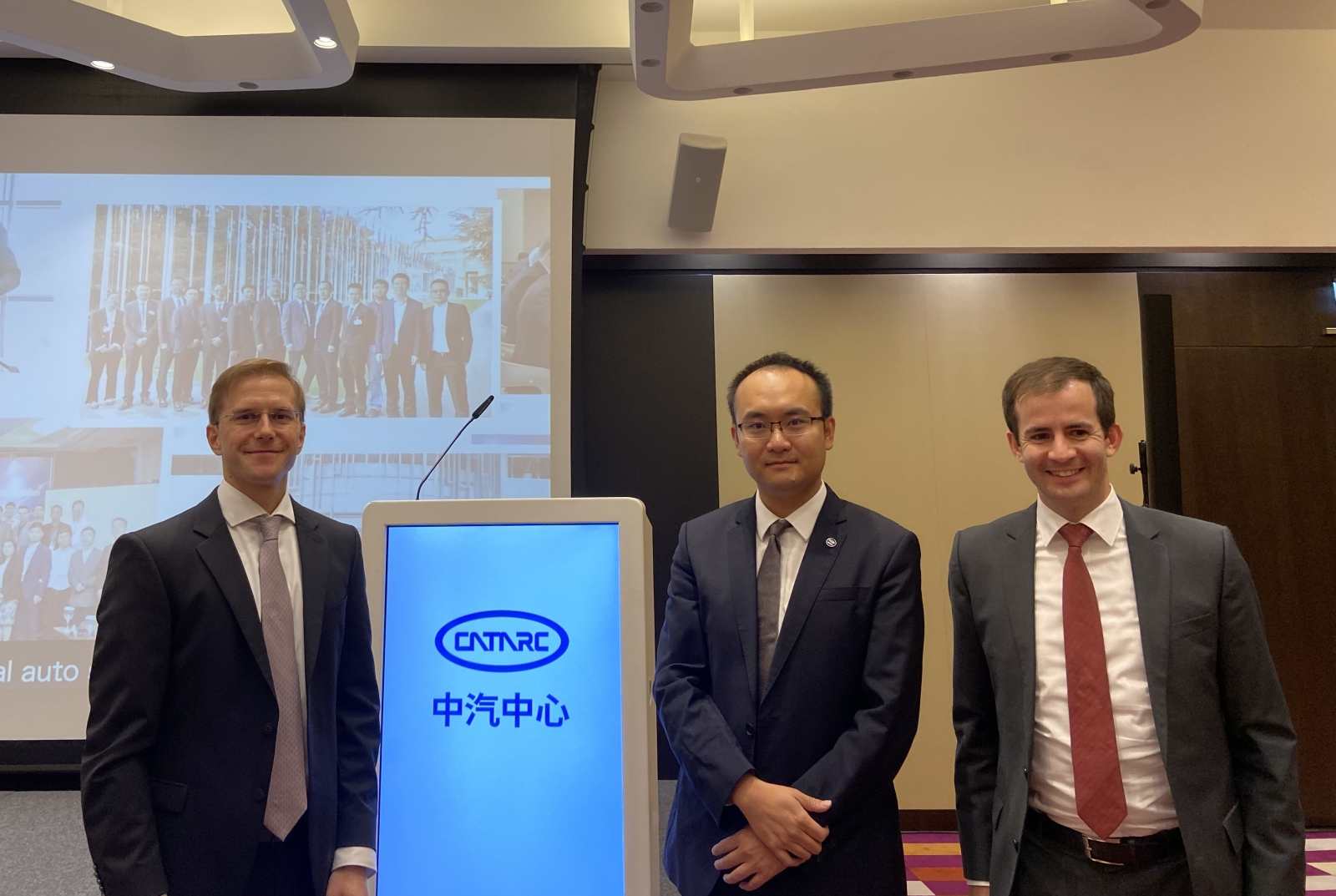
The forum offered a variety of presentations on the Chinese and German automotive industry. High-ranking representatives of CATARC presented new developments in the field of electric mobility and autonomous driving. The Chinese vehicle manufacturer Great Wall presented its plans to introduce its vehicles to the German market.
The VDA and German manufacturers BMW, Mercedes-Benz and Webasto were also in attendance and had interesting presentations.
The forum opened a new perspective on the groundbreaking current developments in the automotive industry, first and foremost electrification, autonomous and connected driving and standardization. The topic of standards and norms for electromobility, battery systems, autonomous and connected driving will play an important role in future developments in the automotive industry.
CCC certification, CCC self-declaration as well as voluntary CQC certification and CCAP certification are among the most important quality and safety certifications that must be obtained for import and distribution of automotive products in China. MPR China Certification GmbH offers vehicle manufacturers and suppliers individual services for certification and testing.
Mutual Recognition of Chinese Certifications
Standardization and mutual recognition of certifications in the automotive sector are the main goals of the Motor Vehicle Certification Alliance, which was ceremonially founded in Nanning, Guangxi, on Aug. 29, 2022. Several important Chinese certification and testing institutions joined the alliance, among them the organizing China Quality Certification Center (CQC) and the China Certification Center for Automotive Products (CCAP).

The automotive sector has been identified and promoted as key industry by the Chinese government. This is mainly due to its major role for the development of a wide range of other branches, including iron and steel, machinery, electronics, and many more. In this context, certifications like the CCC certification, or voluntary CQC certification and voluntary CCAP certification play a key role as an internationally recognized regulatory mechanism for ensuring product quality.
The Motor Vehicle Certification Alliance is intended to accompany and shape this process as a service platform, exchange platform, and innovation platform, which will lead to an improvement in market efficiency and an increase in the overall welfare of the Chinese public. Its central concern is to combine the testing and certification resources of its various members.
The efforts of the Motor Vehicle Certification Alliance focus on the mutual recognition of certificates, which shall avoid repeated product testing and save costs for manufacturing companies. The alliance additionally aims to increase the quality of the services they provide through joint efforts, as well as to strengthen the credibility of Chinese certifications by forming an overarching homologation brand.
Since 2005 MPR China Certification GmbH has been supporting companies in the automotive industry in obtaining their certifications for the Chinese market. We work closely with all major certification institutions and were even awarded the distinction of “Outstanding Certification Company” by CCAP, being the only foreign certification company having achieved this.
We will be happy to check for you whether a particular product is subject to mandatory certification, enable you to obtain the required certifications quickly and hassle-free, and ensure that the certification complies with your requirements as part of the overall vehicle homologation process.
For more information on voluntary CCAP or CQC certification and other Chinese product certifications and how they may affect your company, or for more information about CCC certification in general, the process, and the associated costs, please visit our website and our News Section.
Please do not hesitate to contact us for further details and consultation. You can contact us via e-mail, or call us (UK: +44 2071931135, Rest of Europe: +49 69 2713769150, US: +1 773 654-2673).
Please don’t hesitate to also use our chat-window in the bottom right corner if you have any questions. (Please check your browser settings if you can’t see the window)
You can find more information to download in our free brochure about the voluntary CCAP or CQC certification.
Waymo selects Chinese automaker for its electric robo-taxis
In December 2021, Alphabet subsidiary Waymo announced it would partner with Chinese automaker Geely for its fleet of self-driving cabs. The all-electric and autonomous vehicles will be designed in Sweden (Geely owns Swedish car brand Volvo) and based on Geely’s Zeekr EV. Waymo will take care of the necessary technical equipment and software needed for autonomous driving. In this regard, Waymo announced that there are plans to deploy the vehicles in the U.S. at some point to complement its existing fleet of robo-taxis. Vehicles and components must be awarded a CCC certificate in order for the products to be exported to China or manufactured locally.
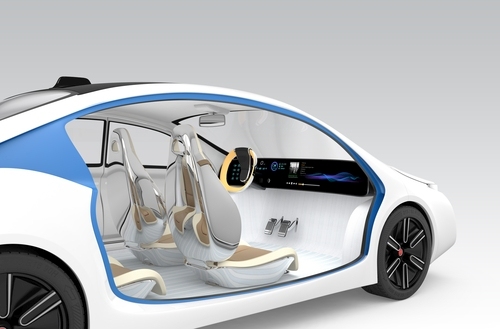
Images of a finished concept car show a vehicle designed specifically for autonomous cab driving. It has a level floor space, low step-in height, and the lack of a B-pillar makes it easier to get in and out. In addition, sliding doors and seats that fold back are used, sufficient headroom is also provided. Waymo shared that future models will not have a steering wheel or pedals. Only a screen is planned, on which passengers will be able to follow the progress of the journey.
Geely and Waymo’s collaboration highlights how almost the entire automotive industry is currently trying to capitalize on the self-driving EV market through partnerships and joint ventures. Waymo is already working with Stellantis and Jaguar Land Rover on autonomous vehicles. Geely, on the other hand, wants to transform Volvo into an all-electric car brand, as it did previously with Polestar.
CCC certification for automotive products is a complex project that requires professional support at all stages. For several years, MPR China Certification GmbH has been entrusted with large CCC projects for the vehicle manufacturers Lotus, Tesla and Bugatti. We will be pleased to provide you with non-binding advice on the scope and requirements of a China CCC certification.
For more information on how CCC certification, the CCC Self-Declaration and voluntary CCAP or CQC certification may affect your company, or for more information about CCC certification in general, the process, and the associated costs, please visit our website and our News Section where you will find current updates twice a week.
Please do not hesitate to contact us for further details and consultation. You can contact us via e-mail, or call us (UK: +44 2071931135, Rest of Europe: +49 69 2713769150, US: +1 773 654-2673).
Please don’t hesitate to also use our chat-window in the bottom right corner if you have any questions. (Please check your browser settings if you can’t see the window)
You can also check out our free CCC-Brochure, which can be downloaded right here as a PDF file or you consult our book (in English) “A Brief Guide to CCC: China Compulsory Certification”, which can be found directly here on Amazon.
Here you can download our brochure about the CCC Self-Declaration.
Here you can download our brochure about the voluntary CCAP or CQC certification.


